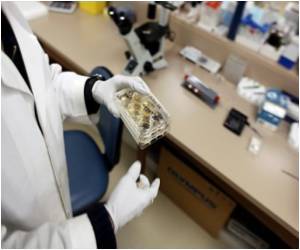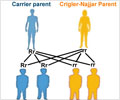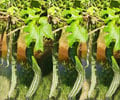Widening the scope of nanomedicines in India, scientists have designed special nanoparticles that break down bilirubin - the yellow pigment found in liver.

Essential to liver health, higher than normal levels of bilirubin in blood (hyperbilirubinemia), may indicate certain diseases in adults as well as newborns.
"High levels may lead to brain damage or even death in newborns and adults, if not treated. To combat this, we designed manganese oxide nanoparticles capped with citrate, a derivative of citric acid found in citrus fruits such as lemons," Nabarun Polley, of S. N. Bose National Centre for Basic Sciences, Kolkata, said.
Polley, a senior researcher at the Centre’s department of chemical, biological and macro-molecular sciences, explained that this nano-hybrid helps to degrade bilirubin and bring it down to a normal level swiftly.
"It is actually like nimbu paani administered through nanoparticles," said Polley, adding lemon juice is usually suggested due to its cleansing nature.
Through experiments performed on lab mice, Polley and his co-investigators at Jadavpur University and Dey’s Medical, showed the nanoparticles to be safe, compatible with the body, and proved that they had the ability to act directly and specifically on the target: bilirubin.
In fact, this precision which is the product’s USP also takes care of the time factor.
The latest findings, which are currently in press for publication in the Nanomedicine journal, open a new door for "cost-effective and efficient therapeutic treatment of hyperbilirubinemia, jaundice and associated diseases," according to group leader Samir Kumar Pal.
"We have been working on detection as well as the treatment aspect of elevated bilirubin. In the near future, we could help avoid preventable deaths of newborns," said Pal, professor at the Centre’s department of chemical, biological and macro-molecular sciences.
Union Minister of Science and Technology Harsh Vardhan, after his visit to Pal’s lab recently, had highlighted on Facebook that neonatal jaundice deaths, comprise 18% of newborn mortality in India.
He was particularly impressed with a non-invasive, computer-based fiber-optic detector fabricated by the group that detects bilirubin levels within three seconds by shining light on the white part of one’s eye.
"Nanomedicine has huge potential for India as it has elsewhere in the world. Specially, diagnostics promises to offer cheap and faster way for detecting diseases for India. This has a huge potential for India because our healthcare is not as widespread," said Praveer Asthana, Mission Director, Nano Mission, Department of Science & Technology, India.
Source-IANS
 MEDINDIA
MEDINDIA




 Email
Email








